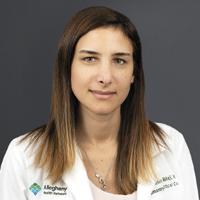Learn more about our appointment options, second opinions, locations, referrals, and resources.
Interventional Pulmonology
About Interventional Pulmonology
Interventional pulmonology is a specialty dedicated to using minimally invasive, nonsurgical procedures to diagnose and treat diseases of the airways, lung tissue, and pleura (the lining of the lungs).
AHN interventional pulmonologists are at the forefront of innovation in this rapidly evolving specialty to provide the latest treatments to AHN patients.
Compared to traditional open surgery, interventional pulmonology offers several benefits:
- Minimally invasive: We use the latest techniques that result in less pain and faster recovery times for you.
- Reduced risk of complications: Lower risk of infection and bleeding.
- Outpatient procedures: Many procedures can be performed on an outpatient basis. You can return home the same day.
- Improved quality of life: Minimally invasive techniques can help patients maintain their lung function and improve their quality of life.
Lung cancer
At AHN, interventional pulmonologists work in partnership with the cancer team to treat patients dealing with lung cancer. This includes complications associated with lung cancer, including fluid buildup or clogged airways.
We use a team-based approach to evaluate patients starting with your diagnosis and then frequently throughout treatment. The team meets weekly to discuss the best approaches to complex cases. This type of approach means your care is being routinely reviewed to ensure it’s meeting the demands of your specific diagnosis.
Through your lung cancer treatment, our interventional pulmonologists work closely with:
- Thoracic surgeons.
- Medical oncologists.
- Radiation oncologists.
- Pathologists.
- Radiologists.
For cases not related to lung cancer, your interventional pulmonologist may also work with Ear, Nose, and Throat (ENT) specialists, allergists, and/or your primary care provider to determine treatment.
Other pulmonary conditions
Working together with a general pulmonologist — the primary provider who provides care for lung diseases — we create individual treatment plans for those who need advanced bronchoscopy. A bronchoscopy is a procedure that looks at the airways using a flexible tube with a camera attached.
With that, your care team can treat other pulmonary conditions including:
- Lung nodule and masses: Both lung nodules and masses are growths that need to be evaluated, monitored, and occasionally examined with a biopsy to determine their makeup. Lung nodules are smaller than masses. A lung nodule can be caused by many different conditions, including infections, inflammation, or sometimes cancer. AHN offers clinics to review nodules and masses and determine the next best steps for each patient.
- Pleural disease: This often leads to a fluid buildup, thickening, or inflammation of the pleura (the lining of your lungs). Interventional pulmonology can treat pleural disease by draining the fluid buildup to ease patient discomfort and help you breathe easier.
- End-stage COPD and emphysema: End-stage COPD and emphysema are serious conditions with a significant impact on quality of life and life expectancy. While there is no cure, some patients with severe COPD or emphysema may be candidates for valve therapy to help with day-to-day symptoms.
- Central airway obstruction (malignant and non-malignant): Also called CAO, this refers to a blockage in the main airways of the lungs, specifically the trachea (windpipe) and bronchi (airways from the trachea). There are two types — malignant and non-malignant — and early treatment of both can help open narrowed or clogged airways to improve breathing and improve outcomes.
Interventional pulmonology procedures
Diagnosing and treating lung and chest conditions at AHN includes interventional pulmonology procedures that are at the forefront of innovation and use minimally invasive techniques that improve your overall quality of life.
Diagnostic bronchoscopy
This is a valuable, minimally invasive tool AHN uses to diagnose and monitor various respiratory conditions. There are different types that help provide a comprehensive view of your health.
- Cryobiopsy: During a bronchoscopy, a cryobiopsy is used to obtain tissue samples (a biopsy) for diagnosis. It involves freezing the targeted tissue with a cryoprobe, which is a device that delivers extremely cold gas (usually nitrogen). The freezing process causes the tissue to become brittle and easier to remove, and it allows for a larger sample to be removed for biopsy. This, and other biopsy procedures, are safe and do not spread any potential cancer cells.
- Robotic bronchoscopy: Robotic bronchoscopy is a minimally invasive procedure that uses a robotically operated camera to navigate throughout the airways. This allows for sampling of smaller and more peripheral spots than traditional bronchoscopy. The robotic arm is controlled by a surgeon who sits at a console and views the inside of the airways on a high-resolution monitor to look for lymph nodes and nodules.
- Linear and radial endobronchial ultrasound: Also referred to as EBUS, this technique uses ultrasound waves to create images of the airways and surrounding tissues. It is used in conjunction with bronchoscopy to identify nodules and improve sampling techniques.
Therapeutic bronchoscopy
These bronchoscopies are done to help alleviate symptoms caused by narrowing or obstruction of the airways. We offer advanced bronchoscopy techniques for relief from symptoms.
Based on your individualized care plan, our specialists can perform a wide variety of techniques, including:
Cryotherapy
Cryotherapy works by applying extreme cold, typically in the range of -148°F to -256°F (-100°C to -160°C), to a tumor to help with shrinkage and removal. It is a common treatment to improve symptoms in patients with metastatic disease.
Electrocautery
Electrocautery is a medical technique that uses heat generated by an electric current to cut, coagulate (stop bleeding), or destroy harmful tissue. The heat vaporizes tissue for precise incisions and seals the blood vessels for more controlled bleeding.
Stenting
An airway stent, also known as a tracheobronchial prosthesis, is a small, expandable tube that is inserted into the airway to keep it open. It’s often used to treat narrowed airways that occur from a tumor being present.
Other treatments
Other therapeutic bronchoscopy treatments include:
- Mechanical debulking: During this procedure, the surgeon makes a small incision to access the tumor. Using minimally invasive techniques, the surgeon reduces the tumor size by removing a portion of the mass using specialized instruments.
- Microdebriders: These are versatile surgical instruments that offer precise tissue removal in a minimally invasive manner. Their ability to remove soft tissue, combined with their suction system and controllability, makes them valuable tools in interventional pulmonology.
- Photodynamic therapy: This is a minimally invasive treatment that uses a combination of a light and photosynthesizing drug to destroy abnormal cells, such as cancer cells.
- Endobronchial brachytherapy: We work with the radiation oncologists to use localized radiation in the airway to reduce or remove tumors.
Bronchoscopic lung volume reduction (BLVR)
Bronchoscopic lung volume reduction (BLVR) is a minimally invasive procedure that aims to improve lung function and quality of life in patients with severe chronic obstructive pulmonary disease (COPD). AHN is the only premier practice in Western Pennsylvania that performs BLVR. This procedure uses a one-way valve to ease shortness of breath in hyperinflated lungs. Patients who have quit smoking and are still symptomatic despite inhaler therapy and pulmonary rehab may be candidates for the procedure.
Patients can ask for a referral from their primary care doctor, pulmonologist or self-refer.
Pleural procedures
- Thoracentesis: During this short procedure, fluid is drained from around the lung to improve symptoms and breathing. The fluid can also be used to test for infection or other illness.
- Tunneled pleural catheter placement and management: Similar to thoracentesis, this procedure is minimally invasive and uses a catheter to remove fluid from the pleural cavity. The catheter is placed in the pleura cavity, where it remains long term to manage fluid buildup in the chest.
Our team of pulmonary specialists
Our experienced interventional pulmonology team regularly collaborates with thoracic surgeons, oncologists, and nurse navigators to guide you through an optimal course of care.

Director of Interventional Pulmonology
Interventional Pulmonology Clinic appointments
Before any procedure, we require all patients to make and complete an initial appointment. This ensures we get a full picture of your overall health. You will not receive a biopsy on your first appointment.
If you have a current diagnosis of lung mass or nodule, you can schedule an appointment by calling the clinic at 412-442-2100. Please bring any current imaging and our office will help you secure a timely appointment at one of our three clinic locations —Allegheny General Hospital, McCandless Neighborhood Hospital, or Jefferson Medical Arts Building.
Patients with severe COPD who are interested in bronchoscopic lung volume reduction (BLVR) should call the Interventional Pulmonary Valve Line at 412-442-2100. To be scheduled, patients will be required to have had recent pulmonary function tests (PFTs) and have quit smoking.
New patients
New patients need a current diagnosis to schedule an appointment. For symptom evaluation and diagnosis, schedule an appointment with your primary care physician, internist, or family doctor.
To find a new primary care physician, internist, or family doctor, go to Find Care to select a doctor near you.
Appointment cancellations
If you need to cancel or reschedule an appointment, call 412-442-2100 at least 24 hours before your scheduled appointment.
Request a call
Complete our short Request a Call form to ask a nonemergency question about a:
- Diagnosis.
- Treatment plan.
- Billing question.
After we receive this form, we'll call you back shortly.
Locations
We have three Interventional Pulmonology Clinic locations.
Allegheny General Hospital
Interventional Pulmonology Clinic
320 East North Ave, Suite 6200 (South Tower)
Pittsburgh, PA 15212
GET DIRECTIONS
AHN McCandless Neighborhood Hospital
Interventional Pulmonology Clinic
8950 Duncan Ave.
Pittsburgh, PA 15237
GET DIRECTIONS
AHN Jefferson Medical Arts Building
Interventional Pulmonology Clinic
1200 Brooks Lane
Jefferson Hills, PA 15025
GET DIRECTIONS
How to refer your patient to us
There are two ways for medical professionals, who are not a part of Allegheny Health Network, to refer their patients to our Interventional Pulmonology Clinic and request an appointment. You can:
- Call 412-442-2100 to speak to someone at the Interventional Pulmonology Clinic.
- Go to Find Care to find the right AHN specialist and the most convenient location. Then refer your patient, provide relevant patient details, and request an appointment directly from the doctor's profile.
For more information about referring your patient to an AHN specialist, check the Independent Physician Referral FAQs.
Follow your patient's health care
After referring your patient to an AHN specialist, use the EpicCare® Link™ platform to collaborate with their AHN specialist and view your patient's test results, treatment plan, and progress.
Log in to your EpicCare Link account now.
If you are new to EpicCare Link, or need to request your own EpicCare Link account, read: EpicCare Link for Patient Follow-up, for user instructions and new account request forms.
When EpicCare Link is not an option
If you can't access your patient's AHN test results through the EpicCare Link platform, your patient will need to complete and submit the correct AHN Medical Records Release form, based on their state of residency. Support your patient's request by downloading the correct medical records release form for them:
EpicCare® is a registered trademark of Epic Systems Corporation and used with permission.
EpicCare® Link™ is a trademark of Epic Systems Corporation and used with permission.




